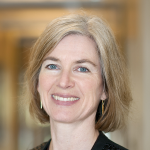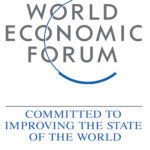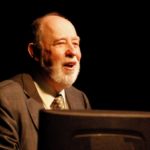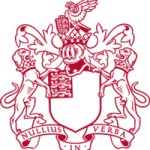The American Society for Cell Biology (ASCB) is honoring Mina Bissell, Distinguished Scientist in the Biological Systems & Engineering Division, for her lifetime contributions to cell biology. In recognition of her key discovery that the role of the tumor microenvironment plays a part in the development of breast cancer, Bissell will receive their highest scientific honor, the E.B. Wilson Medal, at the ASCB Annual Meeting in San Francisco this December. This latest accolade comes just months after Bissell received the 2015 STS/CSS Honorary Medal from the Signal Transduction Society (STS) and the STS Journal Cell Communication and Signaling (CSS) in Weimar, Germany, as well as the Ernst Bertner Memorial Award from MD Anderson Cancer Center.
Doudna Wins Tang Prize in Biopharmaceutical Science
Jennifer Doudna, faculty scientist in the Molecular Biophysics & Integrated Bioimaging Division, will share the prize with Emmanuelle Charpentier and Feng Zhang. They were honored “for the development of CRISPR/Cas9 as a breakthrough genome editing platform that promises to revolutionize biomedical research and disease treatment.” The awards, announced over the weekend in Taipei by Nobel laureate Y. T. Lee, each come with a cash prize of $1.24 million, in addition to funds for research. Read more at Berkeley NewsCenter.
Two Bioscientists Selected for World Economic Forum Honor
Karen Davies, staff scientist in the Molecular Biophysics & Integrated Bioimaging Division, and Jenny Mortimer, Director of Plant Systems Biology at the Joint BioEnergy Institute, are two of 50 extraordinary scientists under the age of 40 who have been selected to participate alongside business and political leaders in the World Economic Forum’s Annual Meeting of the New Champions, which is taking place from June 26-28 in Tianjin, China.
Fleming Awarded the Faraday Prize
Graham R. Fleming, senior scientist in the Molecular Biophysics & Integrated Bioimaging Division, has won the Royal Chemistry Society’s Faraday Lectureship Prize 2016. The prize was awarded for experimental and theoretical achievements that have redefined the study and understanding of fundamental chemical and photobiological processes in liquids, solutions and proteins. A particular emphasis in Fleming’s research is photosynthetic light harvesting and its regulation via nonphotochemical quenching.
Doudna Named Foreign Member of UK’s Royal Society
Jennifer Doudna, biochemist faculty scientist in Molecular Biophysics & Integrated Bioimaging, has been named a foreign member of the prestigious Royal Society. Doudna, who is also a professor of molecular and cell biology and of chemistry and a Howard Hughes Medical Institute investigator, was honored for “her work on CRISPR-Cas9 gene editing technology that is revolutionizing the fields of genetics, molecular biology and medicine.” She is one of 10 new foreign fellows and 50 new fellows who will be joining many of the world’s most eminent scientists in this scientific academy, which is dedicated to promoting excellence in science. Read the Royal Society announcement.
Was this page useful?







